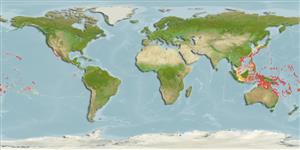Teleostei (teleosts) >
Eupercaria/misc (Various families in series Eupercaria) >
Labridae (Wrasses) > Corinae
Etymology: Pseudojuloides: Greek, pseudes = false + Greek, iouis = a fish without identification, perhaps some of genus Coris cited by Plinius + Greek, oides = similar to (Ref. 45335).
More on authors: Randall & Randall.
Environment: milieu / climate zone / depth range / distribution range
Ecology
Marine; reef-associated; depth range 25 - 45 m (Ref. 90102), usually 32 - 39 m (Ref. 2140). Tropical
Western Pacific: Philippines, Indonesia and Papua New Guinea. Recently recorded from Tonga (Ref. 53797).
Size / Weight / Age
Maturity: Lm ? range ? - ? cm
Max length : 7.0 cm SL male/unsexed; (Ref. 2140)
Dorsal spines (total): 9; Dorsal soft rays (total): 11; Anal spines: 3; Anal soft rays: 12; Vertebrae: 15. Male body orangish brown dorsally, whitish ventrally; spots on body may diffuse to form a midlateral band; large black spot in middle of body continuous with the large black area of the dorsal fin. 10-11 median predorsal rays; 6-8 suborbital pores; 8-11 pores on free margin of preopercle; 3 pores anterior to orbit. Females pink like other species of the genus (Ref. 48636).
Lives in very deep water, usually in depth 30-40 m or more (Ref. 48636). Occurs solitary or in pairs (Ref. 90102) in open rubble bottoms with small corals (Ref. 2140).
Life cycle and mating behavior
Maturities | Reproduction | Spawnings | Egg(s) | Fecundities | Larvae
Oviparous, distinct pairing during breeding (Ref. 205).
Randall, J.E. and H.A. Randall, 1981. A revision of the labrid fish genus Pseudojuloides, with descriptions of five new species. Pac. Sci. 35(1):51-74. (Ref. 2140)
IUCN Red List Status (Ref. 130435)
Threat to humans
Harmless
Human uses
Tools
Special reports
Download XML
Internet sources
Estimates based on models
Preferred temperature (Ref.
123201): 23.8 - 27.9, mean 26.5 °C (based on 31 cells).
Phylogenetic diversity index (Ref.
82804): PD
50 = 0.5000 [Uniqueness, from 0.5 = low to 2.0 = high].
Bayesian length-weight: a=0.00977 (0.00470 - 0.02030), b=3.07 (2.89 - 3.25), in cm total length, based on LWR estimates for this (Sub)family-body shape (Ref.
93245).
Trophic level (Ref.
69278): 3.3 ±0.4 se; based on size and trophs of closest relatives
Resilience (Ref.
120179): High, minimum population doubling time less than 15 months (Preliminary K or Fecundity.).
Fishing Vulnerability (Ref.
59153): Low vulnerability (10 of 100).
